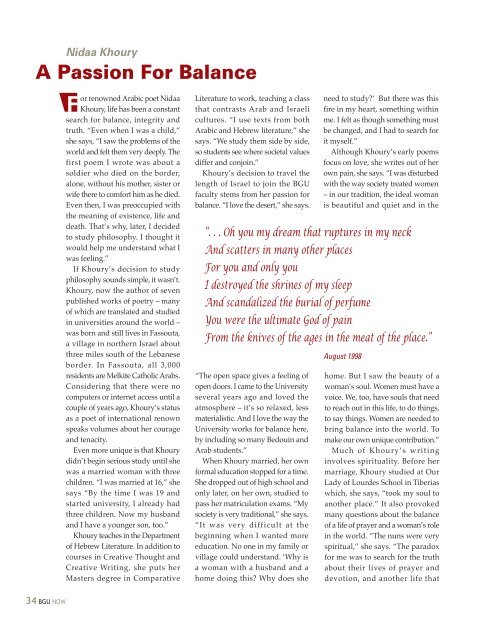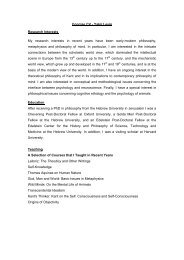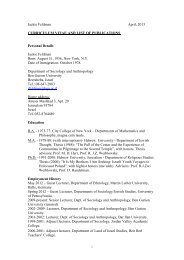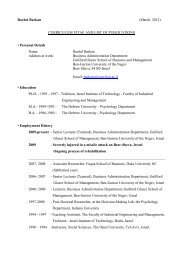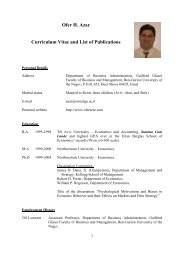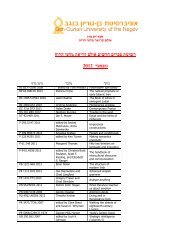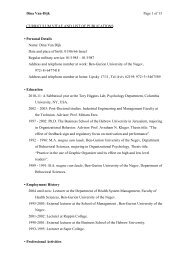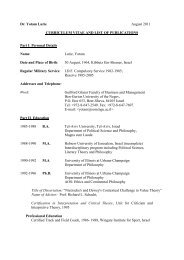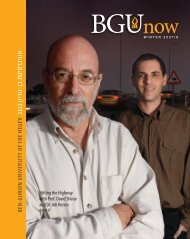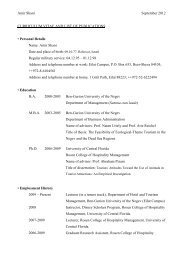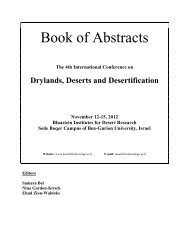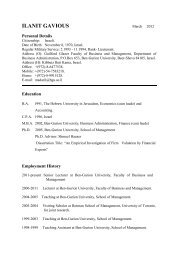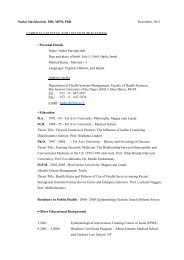cover 2006
cover 2006
cover 2006
You also want an ePaper? Increase the reach of your titles
YUMPU automatically turns print PDFs into web optimized ePapers that Google loves.
34 BGU NOW<br />
Nidaa Khoury<br />
A Passion For Balance<br />
F<br />
or renowned Arabic poet Nidaa<br />
Khoury, life has been a constant<br />
search for balance, integrity and<br />
truth. “Even when I was a child,”<br />
she says, “I saw the problems of the<br />
world and felt them very deeply. The<br />
first poem I wrote was about a<br />
soldier who died on the border,<br />
alone, without his mother, sister or<br />
wife there to comfort him as he died.<br />
Even then, I was preoccupied with<br />
the meaning of existence, life and<br />
death. That’s why, later, I decided<br />
to study philosophy. I thought it<br />
would help me understand what I<br />
was feeling.”<br />
If Khoury’s decision to study<br />
philosophy sounds simple, it wasn’t.<br />
Khoury, now the author of seven<br />
published works of poetry – many<br />
of which are translated and studied<br />
in universities around the world –<br />
was born and still lives in Fassouta,<br />
a village in northern Israel about<br />
three miles south of the Lebanese<br />
border. In Fassouta, all 3,000<br />
residents are Melkite Catholic Arabs.<br />
Considering that there were no<br />
computers or internet access until a<br />
couple of years ago, Khoury’s status<br />
as a poet of international renown<br />
speaks volumes about her courage<br />
and tenacity.<br />
Even more unique is that Khoury<br />
didn’t begin serious study until she<br />
was a married woman with three<br />
children. “I was married at 16,” she<br />
says “By the time I was 19 and<br />
started university, I already had<br />
three children. Now my husband<br />
and I have a younger son, too.”<br />
Khoury teaches in the Department<br />
of Hebrew Literature. In addition to<br />
courses in Creative Thought and<br />
Creative Writing, she puts her<br />
Masters degree in Comparative<br />
Literature to work, teaching a class<br />
that contrasts Arab and Israeli<br />
cultures. “I use texts from both<br />
Arabic and Hebrew literature,” she<br />
says. “We study them side by side,<br />
so students see where societal values<br />
differ and conjoin.”<br />
Khoury’s decision to travel the<br />
length of Israel to join the BGU<br />
faculty stems from her passion for<br />
balance. “I love the desert,” she says.<br />
“The open space gives a feeling of<br />
open doors. I came to the University<br />
several years ago and loved the<br />
atmosphere – it’s so relaxed, less<br />
materialistic. And I love the way the<br />
University works for balance here,<br />
by including so many Bedouin and<br />
Arab students.”<br />
When Khoury married, her own<br />
formal education stopped for a time.<br />
She dropped out of high school and<br />
only later, on her own, studied to<br />
pass her matriculation exams. “My<br />
society is very traditional,” she says.<br />
“It was very difficult at the<br />
beginning when I wanted more<br />
education. No one in my family or<br />
village could understand. ‘Why is<br />
a woman with a husband and a<br />
home doing this? Why does she<br />
need to study?’ But there was this<br />
fire in my heart, something within<br />
me. I felt as though something must<br />
be changed, and I had to search for<br />
it myself.”<br />
Although Khoury’s early poems<br />
focus on love, she writes out of her<br />
own pain, she says. “I was disturbed<br />
with the way society treated women<br />
– in our tradition, the ideal woman<br />
is beautiful and quiet and in the<br />
“. . . Oh you my dream that ruptures in my neck<br />
And scatters in many other places<br />
For you and only you<br />
I destroyed the shrines of my sleep<br />
And scandalized the burial of perfume<br />
You were the ultimate God of pain<br />
From the knives of the ages in the meat of the place.”<br />
August 1998<br />
home. But I saw the beauty of a<br />
woman’s soul. Women must have a<br />
voice. We, too, have souls that need<br />
to reach out in this life, to do things,<br />
to say things. Women are needed to<br />
bring balance into the world. To<br />
make our own unique contribution.”<br />
Much of Khoury’s writing<br />
involves spirituality. Before her<br />
marriage, Khoury studied at Our<br />
Lady of Lourdes School in Tiberias<br />
which, she says, “took my soul to<br />
another place.” It also provoked<br />
many questions about the balance<br />
of a life of prayer and a woman’s role<br />
in the world. “The nuns were very<br />
spiritual,” she says. “The paradox<br />
for me was to search for the truth<br />
about their lives of prayer and<br />
devotion, and another life that


